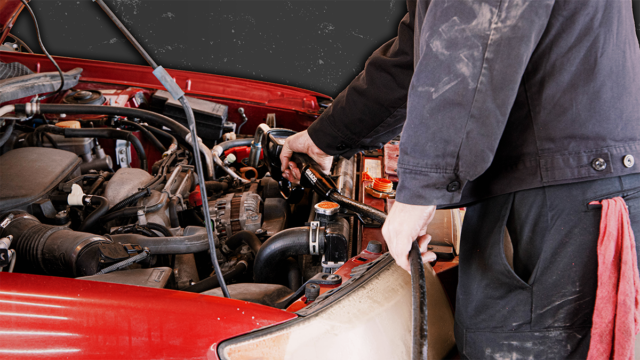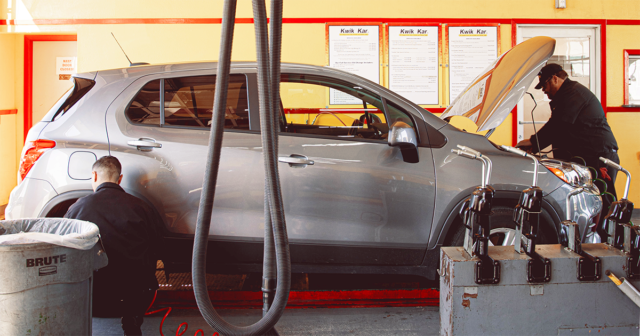Your vehicle is more than a means of transportation; it’s an essential part of your daily life. Whether you’re commuting to work, running errands, or headed on a road trip, your vehicle plays a significant role in facilitating your activities and adventures. However, to ensure your vehicle remains reliable and efficient, regular maintenance is crucial.
It’s easy to overlook the importance of regular maintenance tasks with a busy schedule. From checking fluid levels to inspecting tire pressure, several simple yet critical practices can significantly impact your vehicle longevity and performance. At Kwik Kar, we understand the significance of keeping your vehicle in top condition through regular maintenance. That’s why we’re here to guide you through several essential car maintenance practices that will help you keep your car running like new. By incorporating these practices into your routine maintenance, you can not only extend the lifespan of your car but also enhance your vehicle efficiency, safety, and overall driving experience.
Regular Oil Changes
One of the most important aspects of regular maintenance is ensuring your vehicle engine remains properly lubricated with clean oil. At Kwik Kar, we emphasize the importance of regular oil changes to keep your engine running smoothly and efficiently. Regular oil changes not only prevent friction and wear between moving parts but also help remove dirt and contaminants that can accumulate over time.
Our expert technicians at Kwik Kar are trained to perform thorough full service oil changes for your vehicle. Regular oil changes are recommended based on your vehicle’s make and model, typically occurring every 5,000 to 7,500 miles or as advised by your manufacturer. Complying with regular maintenance helps ensure smooth operation and reduces the risk of engine damage.
Beyond lubrication, regular oil changes offer several other benefits for your vehicle. They help dissipate heat, improve fuel efficiency, and extend the life of your engine. By investing in regular maintenance, such as oil changes, you not only protect your vehicle’s longevity but also enhance its overall reliability and resale value down the road.
Additional Routine Fluid Checks
Brake fluid is another vital fluid that requires regular inspection. Brake fluid facilitates the transmission of force from the brake pedal to the brake system components, allowing you to stop your vehicle safely. Over time, brake fluid can accumulate contaminants with debris or moisture, compromising braking performance. Regular checks and replacements ensure proper brake function and reduce the risk of brake system failure.
Power steering fluid is responsible for assisting with steering wheel movement, making it easier to steer your vehicle. Insufficient or degraded power steering fluid can result in difficulty turning the steering wheel, leading to unsafe driving conditions. Regular maintenance checks and replacements of power steering fluid help maintain smooth and responsive steering.
Transmission fluid has a vital role in lubricating and cooling the transmission components, allowing for smooth gear shifts and optimal transmission performance. Regular checks and replacements of transmission fluid help prevent transmission damage and ensure reliable vehicle operation. By prioritizing routine maintenance fluid checks and replacements, you can protect your vehicle’s vital systems.
Tire Maintenance and Replacement
Monitoring tire tread depth is crucial for determining when tires need replacement. Tires should be replaced when tread depth reaches 2/32 of an inch or if there are visible signs of wear, such as cracks, bulges, or punctures. Regularly checking tread depth using a gauge or performing the “penny test” helps assess tire condition and identify potential safety hazards on the road such as a blow out. Investing in quality new tires not only improves traction and handling, but also enhances fuel efficiency and reduces road noise.
Staying consistent with tire rotation is also important for maintaining even wear and extending tire lifespan. By rotating tires every 6,000 to 8,000 miles (or every time you get an oil change) wear is distributed more evenly across all four tires, preventing premature wear on specific tires and maximizing their overall longevity. This simple regular maintenance task ensures optimal performance and safety, reducing the need for frequent tire replacements.
Annual Texas State Inspection
Regular maintenance is not only essential for keeping your car running smoothly but also for ensuring a passable state inspection. By staying proactive with maintenance tasks throughout the year, you can address potential issues early and increase the likelihood of passing your annual state inspection with ease.
The inspection typically covers essential safety features such as brakes, tires, lights, and seat belts to ensure they are in proper working condition. Technicians also assess emissions-related components to ensure your vehicle meets environmental standards and is not emitting excessive pollutants into the atmosphere. State inspections also include checks for proper vehicle identification, registration, and insurance documentation to ensure compliance with Texas state laws.
Trusting Your Vehicle with Reliable Mechanics
By staying proactive with maintenance tasks throughout the year, you can address potential issues early, increase safety on the road, and reduce the likelihood of costly repairs. When it comes to keeping your car in top condition, trust the local mechanic experts at Kwik Kar where we provide honest and transparent services for you and your vehicle. Our team of skilled technicians at Kwik Kar are committed to providing comprehensive maintenance services to keep your vehicle running smoothly and reliably.
Stop by one of our Denton or Paloma Creek Kwik Kar locations today and experience the difference of expert care at Kwik Kar. Your car will thank you for it!


